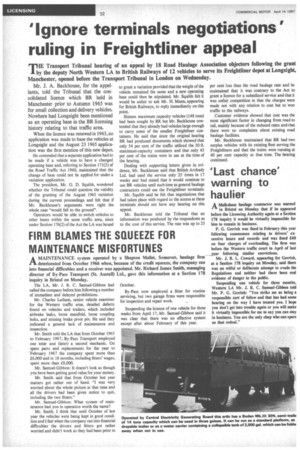'Ignore terminals negotiations' ruling in Freightliner appeal
Page 34

If you've noticed an error in this article please click here to report it so we can fix it.
1 Transport Tribunal hearing of an appeal by 18 Road Haulage Association objectors following the grant
'THE
deputy North Western LA to British Railways of 12 vehides to serve its Freightliner depot at Longsight, Manchester, opened before the Transport Tribunal in London on Wednesday.
Mr. J. A. Backhouse, for the appellants, told the Tribunal that the consolidated licence which BR held in Manchester prior to Autumn 1965 was for small collection and delivery vehicles. Nowhere had Longsight been mentioned as an operating base in the BR licensing history relating to that traffic area.
When the licence was renewed in 1963, no application was made to base the vehicles at Longsight and the August 23 1965 application was the first mention of this new depot.
He contended that a separate application had to be made if a vehicle was to have a changed operating base and, referring to Section 171(2) of the Road Traffic Act 1960, maintained that the change of base could not be applied for under a variation application.
The president, Mr. G. D. Squibb, wondered whether the Tribunal could question the validity of the granting of the August 1965 variation during the current proceedings and felt that if Mr. Backhouse's arguments were right the whole case "would fall to the ground".
Operators would be able to switch vehicles to other bases within the same traffic area, since under Section 176(2) of the Act the LA was bound to grant a variation provided that the weight of the vehicle remained the same and a new operating base could then be stipulated. Mr. Squibb felt it would be unfair to ask Mr. H. Mann, appearing for British Railways, to reply immediately on this point.
Sixteen maximum capacity vehicles (148 tons) had been sought by BR but Mr. Backhouse contended that they already had vehicles large enough to carry some of the smaller Freightliner containers. He said that since the original hearing BR had produced documents which showed that only 54 per cent of the traffic utilized the 30 ft. maximum-capacity containers and that only 45 per cent of the trains were in use at the time of the hearing.
Dealing with supporting letters given in evidence, Mr. Backhouse said that British Arckady Ltd. had used the service only 25 times in 17 weeks and had stated that it would continue to use BR vehicles until such time as general haulage contractors could use the Freightliner terminals.
Mr. Squibb said he felt that negotiations that had taken place with regard to the access at these terminals should not have any bearing on this appeal.
Mr. Backhouse told the Tribunal that no information was produced by the respondents as to the cost of this service. The rate was up to 25 per cent less than the road haulage rate and he maintained that it was contrary to the Act to grant a licence for a subsidized service and that it was unfair competition in that the charges were made not with any relation to cost but to woo traffic to the railways.
Customer evidence showed that cost was the most significant factor in changing from road to rail, mainly because of the reduced rates and that there were no complaints about existing road haulage facilities.
Mr. Backhouse maintained that BR had two surplus vehicles with its existing fleet serving the Freightliners and that the trains were running at 40 per cent capacity at that time. The hearing continued.
























































































































